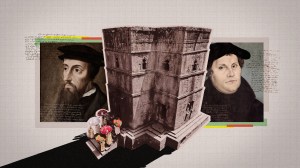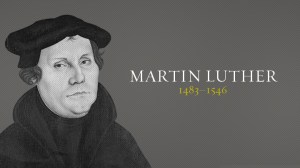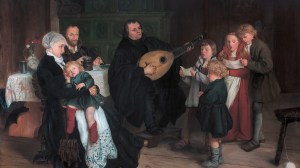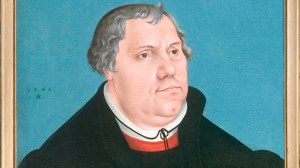In this series

Martin Luther has been called “the last medieval man and the first modern one.” Though raised in the distant medieval world, he has profoundly shaped our own. To understand better Luther’s impact on today’s church and world, Christian History talked with Lutheran historian Martin E. Marty, Fairfax M. Cone Distinguished Service Professor at the University of Chicago, and member of the editorial advisory board of Christian History . Marty is author of numerous books, including, most recently, the multi-volume Modern American Religion (University of Chicago).
Christian History: If Luther were alive today, what would he be writing theses about?
Martin Marty: Every historian says we can’t answer that kind of question, and then every historian answers it!
We have to remember that every historical figure is, in one sense, inaccessible to the modern world. Historian Heiko Oberman reminds us that Luther lived in a different world—a world of witches and unstoppable plagues. So it’s not easy to grab somebody out of his or her context.
That said, we can have some fun hazarding guesses. There’s no more consistent strand in Luther from 1513 [when he begins lecturing on the Bible] to 1546 [when he dies] than the gospel of forgiveness. That theme still isn’t heeded well.
In our day, we emphasize the gospel of self-esteem, marketing the church based on people’s needs, saying, “I found it!” and “I’m the little engine that could.” Our culture promotes human ability and human will, as did the indulgence culture in Luther’s day, as a way to bring salvation. So I have a hunch Luther would still feel compelled to speak his central message.
Would Luther quarrel with Roman Catholicism today?
The language of the sacrifice of the Mass, which disturbed Luther more than anything else, still remains. Yet there’s a hint of a whisper that today’s Catholic understanding isn’t that much different from what we mean in most Protestant Communion services when we talk about offering ourselves in response to the Lord. Within Catholicism today, there is less accent on the Mass being a priestly act of good works.
Also, when I look at Catholic teachings on the Book of Romans and the Book of Galatians, most of which acknowledge the critical role of grace and faith, I have to say Luther has made his point. I don’t know that he would be as disturbed with Catholicism today as he was in the 1500s.
At the Second Vatican Council, in our lifetime, the Roman Catholic church profoundly reshaped itself. If those changes had come at the Council of Trent, in Luther’s lifetime, would there still be one church in the West?
No. There isn’t ever going to be one church in the West. However much I may yearn for such unity, I don’t believe it’s possible in the modern world—a world of choice, diversity, rapid communication, and human autonomy. In the face of the many, many cultures in today’s world, I have no way of picturing something called the Western Church.
Is there any place, then, for Protestant-Catholic dialogue?
I think the most important Protestant-Catholic dialogue is what happens in Decatur, Illinois, and Dover, Delaware. It happens when people work in homeless shelters or do joint Bible studies or canvas their neighborhoods or jointly sponsor refugees. It happens when Catholic and Protestant seminaries offer cooperative courses. That’s when real dialogue occurs.
Where do you most see Luther’s impact on our world?
I don’t believe in the heroic concept of history, in which one person overshadows everything. I see Luther in the context of late medieval ferment: there is reform all over, and somehow a revolt in the junior faculty at Wittenberg is the one that catches on. Because Luther is a titanic character, he leaves his stamp on history.
In history, when there was a ferment of drama, out of it came Shakespeare. When there was an emphasis on the epic, out of it came Homer. When there was a stirring of democratic idealism, Jefferson emerged. Luther is one of those figures who summarizes an age.
Having said that, I have a hard time picturing several aspects of the modern world without Luther. Take, for example, the prominence of the gospel of forgiveness. Though others championed this doctrine as well, Luther was fiery hot. That emphasis (though maybe not with the same heat) still characterizes half a billion people called Anglican, Lutheran, Baptist, Evangelical, and the like. That is the longest shadow Luther casts today.
Also, Luther stands symbolically as the greatest single agent in increasing the value of the individual. What eventually emerges (although it took two more centuries and couldn’t have happened without the Enlightenment) is a new kind of individual. That made democratic government possible.
“I have a hard time picturing several aspects of the modern world without Luther.” —Martin E. Marty
What forces, if any, did Luther not intend to set in motion?
Luther would never have said he contributed to modern nationalism. Particularly in his later writings you find endless heapings on the German people: he saw them as loutish, selfish, drunk, self-centered, stupid.
Still, Luther politically and culturally coalesced the German people; he helped to unite in language and culture the two hundred to three hundred little Germanic states. Luther thus contributed to the breaking up of the Holy Roman Empire and the rise of nationalism.
Nationalism, of course, is a mixed blessing. We’re better off with it than we were with the Holy Roman Empire or with tribalism. But modern nationalism is often the rival of the Christian faith; it summons almost idolatrous assent. And Luther inadvertently contributed to this force.
Second, Luther contributed to anti-Semitism in Germany. Because Jews frustrated him by not accepting the gospel, he turned on them, writing, “Burn their synagogues and drive them out!” Not much happened with that sentiment for a couple of centuries, but beginning in the 1800s, anti-Semitism increased more and more. It’s stupid to say Luther is Hitler’s spiritual ancestor. But it’s not stupid to say that in his rather blind striking out at Jews, Luther unintentionally provided the passion, vocabulary, and rationale for some horrible things that happened to Jews in our time.
Any positive, though unintended, legacies of Luther?
Luther contributed unintentionally to the rising status of women.
He was patriarchal, but I teach my students to judge people in the context of their time, and for his day, Luther was progressive. He assumed that girls, along with boys, should be taught the catechism, and in that he anticipated co-education. He insisted that marriage was just as important a vocation as monasticism, and in that he accorded greater status to a woman’s role in marriage. And he was married to and proud of a woman who was, in effect, the treasurer, manager, and administrator of a rather complex business—the informal boarding house that the Luthers kept.
From Luther’s day to ours, people have suggested the great reformer was somehow psychologically troubled. Is there any basis to those charges?
Luther often showed signs of being troubled, and at times he himself all but said that. But my hunch is that all geniuses are psychologically troubled in one way or another. Mozart, Michelangelo, Goethe, Dante, Milton—almost every creative genius except Bach—seemed somehow to be a misfit in the world. That leads such people to set the world right, and it leads them to create great works of beauty or agony. People who live in complete serenity with the world, who are completely balanced, make wonderful citizens and good Christians, but they probably don’t leave works of genius behind them.
Is Luther a model for you?
Yes. First, in music. In the Protestant churches, we take for granted our singing tradition. We forget that singing used to belong only to monks and priests. But as a result of Luther, lay people erupt in song, and composers are inspired.
I never go through a day without listening to some Lutheran chorales or organ renditions of great Christian music. Luther wrote that music is next to theology, and I’m convinced he liked music better than theology.
Second, I get a great deal out of Luther’s concept of vocation. I believe that if people could see the connection between the gospel of forgiveness and vocation, guilt and worry would be minimized. It’s a message that each day is a new start: you’re not held back by what has been, and you’re not haunted by the future. I would like to see a therapy built of this great concept.
Third, Luther reminds me that one does not try to attain access to God on God’s level, but on the human level. I’m not interested in contemplation or meditation or seeing the face of God directly. In the Heidelberg Disputation, Luther said we have to be content with the hind parts of God.
Consequently, I look to God as he has made himself plainly visible to us in the sacrifice of Christ, in the Bible, in the church, and in divine actions in history. Naturally, this inspires me very much as a historian.
Copyright © by the author or Christianity Today/Christian History magazine. Click here for reprint information on Christian History.
















